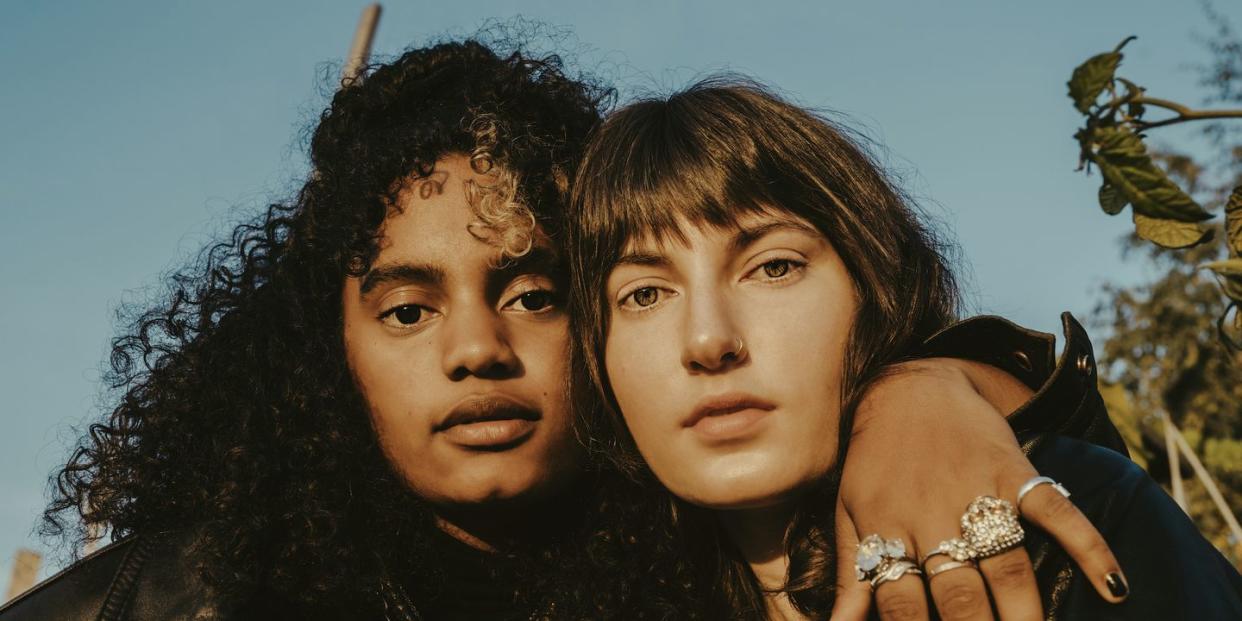What is Birth Order Theory and how does it influence relationships?

Feel like you *always* have to look after everyone around you and never get to focus on your own needs? You could be experiencing Eldest Daughter Syndrome. Or maybe you’re a chronic people pleaser and happen to be the middle child in your family. And let's not forget about those fun-loving (read: attention-seeking) youngest siblings.
Birth Order Theory - the theory that what order you were born in affects your personality - is back in vogue. On TikTok the hashtag Birth Order has 594.6M views, and people have gotten so into the trend that Bumble has just released a Birth Order dating guide. The dating app has likened the theory to Astrology saying; “we know that astrology is a key signal of compatibility for many, with more than 1 million people adding their star sign to their Bumble profiles in the UK. Now, our Birth Order Dating Guide offers an alternative way of gauging compatibility.”
So what is birth order theory and can it actually help you find love? We spoke to Chance Marshall, Therapist and Founding Partner at Self Space to get the insider knowledge.
What is Birth Order Theory?
While it might be enjoying a moment right now thanks to TikTok, Birth order theory is a lot more than just an internet theory. The idea actually dates all the way back to the early 1900s when Austrian psychologist Alfred Adler first proposed the idea that children may have certain traits depending on where they fit into the family based on when they were born.
Alder went as far as to say that where you land in the order of your siblings could have an impact on everything from your personality, relationships and even your career.

While the internet may love it, Alder’s theory has always been controversial among psychologists. “A good psychotherapist holds theories like this with a pinch of salt, but we also reference them,” says Marshall.
He also points out that the theory is from over a century ago, so we have to put it in the context of the time. “Like anything from the 1900s, we have to be discerning with it. There's little evidence in it, despite the level of attention it's received over the years,” he says.
We use familial psychology to assess our relationships more than we even realise. From daddy issues and generational trauma to attachment theory and the sister wound, most of how we perceive the way we relate to others stems from some old school theory on the way we were raised. But what does Birth Order Theory actually say about people’s personalities? Do any of these traits and profiles actually resonate, or can they more or less be applied to anyone?
Eldest Child
According to birth order theory, firstborns tend to be ambitious, disciplined and good leaders. “[Alder] talked about firstborns receiving a lot of attention from parents, but this obviously changes when younger siblings arrive. As a result, firstborns might develop qualities like leadership, responsibility, and perfectionism. They might feel pressure to excel and be role models for their younger siblings, or feel resentful and act out,” says Marshall.
When it comes to romantic relationships, eldest children are the planners - think date night itineraries. “This can be handy in a relationship as plans are easily made and date admin remains minimal. However, this can cause issues if they are used to being in control all the time. Equally, if they are left to do all the organising, they may end up feeling frustrated or taken advantage of,” says Bumble’s Sex and Relationships Expert, Dr Caroline West.

Middle Child
Middle children are the peacekeepers, finding themselves acting as a buffer between their siblings and their eldest sibling and parents. “They might feel squeezed between the expectations placed on the firstborn and the relative freedom of the youngest. Middleborns might develop traits like diplomacy, empathy and a desire for fairness,” says Marshall, adding that middle children may also seek attention through different means, such as being people pleasers, not making too much of a fuss or asking for too much.
Middlies bring these skills to relationships too, being adept at finding balance. “However, these skills often come at the cost of advocating for their own needs which can lead to resentment and miscommunication,” says Dr West.
Youngest Child
Youngest children have a reputation for being the wild ones, having been given the most free-reign by now-experienced parents (especially in contrast to eldest children, who, according to the theory, receive the most discipline). Marshall says they also receive a lot of attention and pampering from their parents, which can lead to a sense of entitlement. “They might also develop a rebellious streak and strive to differentiate themselves from their older siblings,” he adds.
As a result, youngests bring a lot of spontaneity and adventure to relationships. Dr West says; “Last-born children may be adventurous and social as they grew up with older siblings and often tried to keep up with them. This sense of risk taking and adventure can be fun in a relationship, but can cause issues when dealing with issues that arise. The initial honeymoon stage is fun and exciting, however last-borns may struggle as this phase passes and develops into calm emotional intimacy.”
Only Child
According to the theory, only children have similar traits to first borns, as they also shoulder the weight of their parent’s expectations and investment. But, without other siblings to compete with for attention, they may be less competitive. They also tend to be independent, having spent a lot of time alone or around adults as a child.
“In relationships, this might impact how arguments are solved, or how partners are supported,” says Dr West, “for a relationship to be successful, emotional maturity alongside empathetic and understanding approaches to resolving conflict is key. Create a space where each partner feels that they are safe to be vulnerable and talk about their true feelings.”

Why is Birth Order Theory having a resurgence?
So why is Gen-Z talking about an obscure theory from the 1900s? Well, Bumble is right; while Astrology has always been popular, dating is all a bit esoteric right now - with trends like astrodating, manifesting and twin flame rituals all the rage.
While it might be slightly more rooted in science and psychology than astrology, birth order theory still scratches our itch, offering an explanation beyond ourselves of why we do certain things or why relationships pan out the way they do. It's not that dating a DJ with a misspelled tattoo was a bad idea, it’s because he was a rebellious middle child and you’re a Type A eldest daughter!
And that’s before we even get into the rise of ‘therapy speak’. “TikTok therapists and people are desperately reaching towards something that will explain why they are how they are,” says Marshall, who sees the resurgence of birth order theory as a part of a ‘massive wave’ to overpathologize everyday human experiences.
“While it's essential to acknowledge and address why we are how we are, we can reduce complex emotions, personalities, psyches and relational dynamics to mere disorders or theories. By turning ordinary struggles into diagnoses or 'categories', we run the risk of oversimplifying the intricacies of the human psyche and inadvertently discouraging self-reflection and personal growth,” he adds.
So, while birth order theory might be a fun way to test your compatibility with a prospective lover - don’t get too wrapped up in planning your life around when you were born.
You Might Also Like


